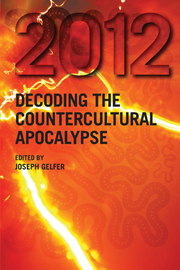Book contents
- Frontmatter
- Contents
- Contributors
- Preface
- 1 Introduction
- 2 The 2012 Phenomenon: New Uses for an Ancient Maya Calendar
- 3 Maya Prophecies, 2012 and the Problematic Nature of Truth
- 4 Mayanism Comes of (New) Age
- 5 The 2012 Milieu? Hybridity, Diversity and Stigmatised Knowledge
- 6 Chichén Itzá and Chicken Little: How Pseudosciences Embraced 2012
- 7 Roland Emmerich's 2012: A Simple Truth
- 8 The 2012 Movement, Visionary Arts and Psytrance Culture
- 9 In a Prophetic Voice: Australasia 2012
- 10 Approaching 2012: Modern Misconceptions versus Reconstructing Ancient Maya Perspectives
- Notes
- Index
10 - Approaching 2012: Modern Misconceptions versus Reconstructing Ancient Maya Perspectives
- Frontmatter
- Contents
- Contributors
- Preface
- 1 Introduction
- 2 The 2012 Phenomenon: New Uses for an Ancient Maya Calendar
- 3 Maya Prophecies, 2012 and the Problematic Nature of Truth
- 4 Mayanism Comes of (New) Age
- 5 The 2012 Milieu? Hybridity, Diversity and Stigmatised Knowledge
- 6 Chichén Itzá and Chicken Little: How Pseudosciences Embraced 2012
- 7 Roland Emmerich's 2012: A Simple Truth
- 8 The 2012 Movement, Visionary Arts and Psytrance Culture
- 9 In a Prophetic Voice: Australasia 2012
- 10 Approaching 2012: Modern Misconceptions versus Reconstructing Ancient Maya Perspectives
- Notes
- Index
Summary
The topic of 2012 can be debated and discussed from at least four different perspectives: (1) scholarly work to reconstruct authentic Maya beliefs; (2) popular writers and so-called “New Age” model-makers; (3) the mass media; (4) what contemporary Maya leaders themselves think of 2012. I have treated all four of these perspectives in detail in my recent book, The 2012 Story: The Myths, Fallacies, and Truth Behind the Most Intriguing Date in History (Jenkins 2009). These areas often overlap. For example, the media may attempt to embrace and report on all these positions. However, more often than not the mass media simply assumes and orients its reporting to the most ridiculous doomsday presentation. At best, the mass media will frame its discussion in a biased way which simply reflects modern misconceptions. For example, the one overall misconception, which I will not discuss at length here since it has been so overplayed, is that the ancient Maya predicted the end of the world in 2012. As I have been pointing out for some twenty years, there is no evidence for this assumption. It is, however, an expected talking point for a dumbed-down mass media that thrives on sensationalism.
Since the mid-1980s I have studied and written about Maya astronomy, cosmology and calendrics. I have an ancillary interest in how the 2012 topic has been increasingly appropriated by the popular imagination, including exploitative and opportunistic writers.
- Type
- Chapter
- Information
- 2012Decoding the Countercultural Apocalypse, pp. 163 - 181Publisher: Acumen PublishingPrint publication year: 2012



